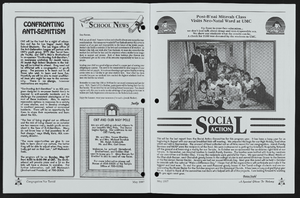Search the Special Collections and Archives Portal
Search Results
Nevada Consolidated Copper Company Photograph Albums
Identifier
Abstract
The Nevada Consolidated Copper Company Photograph Albums (1906-1907) contain two photograph albums from the mining company's chief engineer's office. The photograph albums include cyanotype and black-and-white photographs depicting the construction of the smelting plant, equipment, railroad, and landscape of Ruth, Nevada.
Archival Collection
Southern Nevada Historical Society Records
Identifier
Abstract
The Southern Nevada Historical Society Records document the management and development of the Southern Nevada Historical Society (SNHS) as well as various historical projects in Las Vegas and Southern Nevada that the society sponsored from 1948 to 1983. The records include SNHS correspondence (1951-1978), meeting minutes (1958-1983), and accounting information (1959-1980). It also contains copies of the SNHS Backtrails Newsletter, promotional material for events, membership lists, and research materials for various projects related to the history of southern Nevada and Las Vegas.
Archival Collection
Willard H. George Furrier, Ltd. Scrapbooks
Identifier
Abstract
The Willard H. George Furrier, Ltd. Scrapbooks are comprised primarily of three leatherbound scrapbooks containing black-and-white and sepia toned photographs taken from the 1920s through 1955. The scrapbooks feature actresses from Hollywood, California wearing furs designed and created by furrier Willard H. George. Actresses of note include Lucille Ball, Rita Hayworth, and Greta Garbo.
Archival Collection


Meeting minutes for Consolidated Student Senate, University of Nevada, Las Vegas, March 20, 1979
Date
Archival Collection
Description
Text

Transcript of interview with Brian Cram by Stefani Evans and Claytee White, October 28, 2016
Date
Archival Collection
Description
Throughout his career, former Clark County School District Superintendent (1989–2000) Brian Cram took his father's words to heart. He heard them repeatedly over the years as he watched and later, helped, his father clean classrooms at Robert E. Lake Elementary School: this place—the classroom—this is the most important place. Cram was born in Caliente, where his father worked on the railroad. In 1939, when Cram was a toddler, the family moved to Las Vegas and his father found work first as a sanitation engineer at a hospital, and then at CCSD as a custodian. The elder Cram, who spent his formative years in the Great Depression, prided himself on doing "good, honorable work" as a custodian, because the work—the classroom—mattered. Even so, he wanted more for his son. Cram largely ignored his father's advice during his four years at Las Vegas High School, where he ran with The Trimmers car club, wore a duck tail and a leather jacket, and copped an attitude. Cram's swagger, though, d
Text

Transcript of interview with Marcy and Jack Simon by Barbara Tabach, May 16, 2018
Date
Archival Collection
Description
It was 1964 when Jack Simon met Marcy Stiel at a mutual friend’s wedding. Smitten from the beginning, the couple married shortly thereafter. Thus began their loving partnership that has flourished in business, community involvement, and most importantly in raising their two sons, Ron and Steven. The Simon’s can be a modest power couple. However, they are clearly capable of making things happen. When they first married, Jack was a California electrical contractor and homebuilder and Marcy became his business administrator. The Simons through their Electrical Company, Expo-Tech Electrical & Plumbing Services, Inc. won the contract to provide all of the electrical services for the entire 1984 Los Angeles Olympics, encompassing (26) twenty six venues located in California spanning from San Diego to Stanford University. The trajectory of the business was extraordinary, establishing twelve offices nationwide to provide temporary electrical and plumbing services for conventions and special events. Expo-Tech was eventually bought by industry giant GES. Their success was due in large part to Jack’s technical knowledge and Marcy’s administrative and marketing skills. With entrepreneurial zest, and over the period of eleven years, the couple found their way into the ownership of four local casinos in Elko and Wendover Nevada. Marcy was one of the first women in Nevada to hold multiple gaming licenses. In total, she held four Unrestricted Gaming Licenses. The Simons hosted Passover Seders for the Elko Jewish Community during their ownership of the casinos. In 2004, Marcy and Jack sold the four casino operations. Since moving to Nevada in 1994, the couple has made a warm and lasting impression, being generous in their focus for the well-being of the Jewish community. They are among those that actively paved the way for SB26, which outlaws government bodies from conducting business with companies that boycott Israel. They continue to be tireless advocates and philanthropists in Jewish organizations of Las Vegas and Nevada.
Text

Transcript of interview with Bernice M. Johnson by Dan Buress, February 21, 1979
Date
Archival Collection
Description
On February 21, 1979, Dan Buress interviewed Bernice Johnson (born September 13, 1919 in Los Angeles, California) in her home in Las Vegas, Nevada. The two discuss Mrs. Johnson’s personal history and her reasons for moving to Las Vegas. Johnson describes moving between Southern California and Las Vegas while her husband worked for the railroad company. The interview concludes with Johnson recalling her memories of the Von Tobel family and the rapid population growth in Las Vegas after the construction of the Nevada Test Site.
Text


